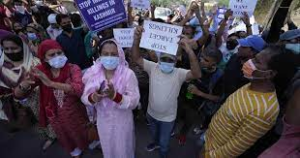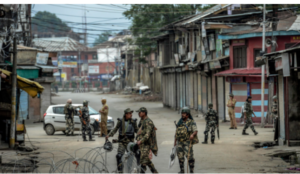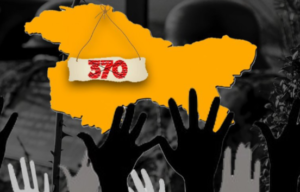
The Kashmir Dispute and Its Human Rights Implications.

Introduction
The Kashmir dispute has been a long-running conflict in the area for decades, with serious human rights consequences.
The disputed state of Kashmir, nestled in the Himalayas, has been a source of friction between India and Pakistan since their independence in 1947.
This essay seeks to shed light on the human rights concerns that have arisen as a result of this lengthy conflict, as well as the critical necessity for a peaceful end.

The Conflict
The Kashmir conflict arose during British India’s partition when princely states were given the option of joining either India or Pakistan. Jammu and Kashmir’s monarch, Maharaja Hari Singh, chose freedom.
Soon after, Pakistani soldiers invaded the territory, prompting the Maharaja to seek Indian aid, resulting in the first Indo-Pakistani war over Kashmir.
The Kashmir conflict is a long-running dispute between India and Pakistan over control of the Kashmir territory. The territory is located in the Himalayas and is shared by both countries. The majority of the territory is controlled by India, with Pakistan controlling a minor section in the north.

The Kashmir issue extends back to India’s partition in 1947. The British Indian Empire was split into two sovereign countries at the time: India and Pakistan. The split was religiously motivated, with India becoming a Hindu-majority country and Pakistan becoming a Muslim-majority one. The Kashmir territory was mostly Muslim, yet it was administered by a Hindu maharaja.
The Maharaja first wanted to join India but changed his mind and joined Pakistan. As a result, India and Pakistan went to war, and the territory was partitioned between the two countries. Since then, the Kashmir conflict has been a cause of contention between India and Pakistan.
Both nations claim the whole territory, and none has been ready to make any concessions. The conflict has resulted in multiple conflicts between the two countries, as well as being a significant cause of instability in the area.
The Kashmir issue has also had a substantial influence on regional human rights. In Kashmir, both India and Pakistan have been accused of human rights violations. India has been accused of deploying disproportionate force against Kashmiri separatists, and Pakistan of backing terrorist organisations operating in Kashmir.
Human Rights Violations
The long-running war in Kashmir has resulted in a slew of human rights crimes on both sides of the Line of Control (LOC). Extrajudicial murders, enforced disappearances, arbitrary arrests, torture, sexual assault, and limits on free expression and assembly are examples of these abuses.
Countless acts of violence have occurred throughout the region, resulting in civilian fatalities and widespread migration. Human rights violations in Kashmir have had a severe impact on the indigenous people, which have been exposed to a condition of constant dread, trauma, and unrest.
The massive presence of security personnel, as well as their broad powers provided under special legislation such as the Armed Personnel Special Powers Act (AFSPA), have led to an atmosphere of impunity, undermining confidence between the state and the people.
The failure to hold those responsible for human rights violations accountable has generated discontent and extremism among some segments of the populace.

The Kashmir issue is complicated and intractable. There is no simple answer, and it is likely to remain a source of contention between India and Pakistan for many years. However, it is critical to remember that the people of Kashmir’s human rights must be respected. All sides to the conflict must take action to guarantee that the people of Kashmir’s human rights are protected.
Here are some of the recorded human rights violations in Kashmir:
- Extrajudicial executions
- Torture, rape, and enforced disappearances
- Restriction of free expression and assembly
- Access to healthcare and education is denied.
These atrocities have wreaked havoc on the people of Kashmir. The world community is deeply concerned about the human rights situation in Kashmir. Numerous reports by human rights organisations and the United Nations have emphasised the significance of conducting investigations into suspected violations and settling the disagreement peacefully. Various states and international agencies have called for discussion between India and Pakistan to achieve a mutually acceptable settlement.
A lasting and peaceful resolution to the Kashmir conflict is critical not only for addressing the human rights situation but also for promoting regional stability and development. This necessitates earnest efforts on the part of all parties. Confidence-building measures, such as reducing military presence, initiating dialogue between India, Pakistan, and representatives of the people of Jammu and Kashmir, and respecting the local population’s human rights, are critical for fostering a peaceful environment.
Conclusion
The Kashmir conflict has had far-reaching human rights consequences, creating enormous misery and hardship for the people of the region. The international community must continue to prioritise this issue, pressing both India and Pakistan to participate in meaningful conversation and find a reasonable and peaceful settlement that respects the Kashmiri people’s aspirations and rights. Only by a thorough conclusion will this fragile area attain sustainable peace, stability, and justice.







